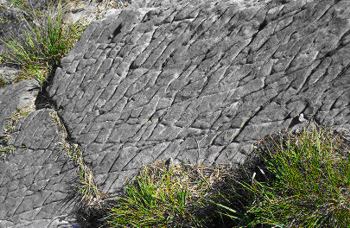Rocks, Primroses, Primates and Religion
- Complaining about the Mainland - 17th August, 2024
- New island designation – is it just greenwash? - 26th April, 2024
- Police and Crime Commissioners – a solution or a problem? - 21st April, 2024
By The Hampshire Ponderer The Ponderer cheerfully admits to being a religious person with a lifelong admiration for science and scientific methods. He’s bucked up by accepting that the rock in the photo is a hundred million years old, because this puts human history into perspective.

He doesn’t understand the controversy about the relationship of science and religion because for him both seem equally important parts of human experience. Dawkins’ and Hitchens’ attacks on religion seem fair enough so far as they go ” religion has an appalling history of hatred and violence ” but miss the vital point that the hatred and violence is not a characteristic of religion only but of human nature, and that science itself gives the reason for this with its investigation of human origins and of evolutionary theory. Look at starlings battling on the bird table for sole access to the food; and you will see a reflection of motorists at a red light, in gear, foot on throttle, desperate to beat the next car. If we don’t know ourselves to be animals we’ll never understand the significance of being human. If we want to show our humanity by moving on from the battle for survival that characterises the natural world, religion offers, alongside its failures, a reservoir of insights and experience that is tried and tested. Archbishop Rowan Williams made a significant point when he wrote:
Human activity is misunderstood if it is seen as a sequence of ‘responsible’ decisions taken by a conscious and self-aware person, in control of his life. More often it is a confused, partly conscious, partly instinctive response to … a world we do not dominate.
Certainly a vital part of our lives concerns objective and verifiable knowledge. It matters that we have accurate and dependable information about the genetic sequence of a chromosome or our bank balance. Equally it matters how we use that information but we need to accept that objectivity is not the definitive quality of every part of life. It contributes to but doesn’t govern our decisions about moral values which need to be weighed up and acted on in the “confused, partly conscious, partly instinctive” way in which we respond hourly to the fact of our existence. Nor, although this would be disputed by many religious people, does objective knowledge govern faith. We make a thousand decisions every day by conscious thought and instinctive reaction, we use a bit of logic and a lot of intuition and at the end of it all we weigh up the outcome by a subtle and intricate process of judgement that has been formed over our lifetime. Then, and this is a central point, we need to recognise that faith is as intimate to us as logic, the only question is how and what we believe. A certain sort of faith is part of the way we know about science. We might not understand the processes which led Heisenberg to formulate the Principle of Uncertainty but have no hesitation in accepting that this is ” at least for the time being ” a crucial step in understanding the nature of the atom. This capacity is part of what distinguishes us from other animals in the natural world. While we are still powerfully influenced by the struggle for survival, and have ‘kill or be killed’ in our genes, we are also able to think about ourselves in a way they can’t.

But there is another part of ourselves that looks beyond the struggle against others and finds one thing distinctive of Homo sapiens which is that we not only think but that we love, we recognise beauty and generosity. It’s important to ask from time to time why it is we like looking at primroses, which brings us to the subject of God. If we try to work out the meaning of God not by starting from assertions of scripture or an authoritative church but by looking at the qualities of love or beauty or generosity; we can conceive that to have perfection as something to be aimed for gives human existence a purpose. That in turn allows the possibility that God is the name given to the perfection of love and that for us to try to shape our lives in such a way that we become more perfect in love is not just a worthwhile aim but one which gives meaning to everything else. We can then return to the other areas of life including scientific thought, bringing up families, working out how to live in a liberal democracy, understanding the nature of scripture and tackling the consequences of global capitalism with some effective tools to use for the task. This is by no means all of the story but it’s meant to suggest we needn’t stick with the sterile bickerings about authority which have clogged up discussions between science and faith for too long now. The Hampshire Ponderer
